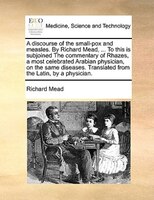Richard Mead
Richard Mead (11 August 1673 – 16 February 1754) was an English physician. His work, A Short Discourse concerning Pestilential Contagion, and the Method to be used to prevent it (1720), was of historic importance in the understanding of transmissib
... Read more
Richard Mead (11 August 1673 – 16 February 1754) was an English physician. His work, A Short Discourse concerning Pestilential Contagion, and the Method to be used to prevent it (1720), was of historic importance in the understanding of transmissible diseases.The eleventh of thirteen children of Matthew Mead (1630–1699), an Independent minister, Richard was born at Stepney, London. He studied at Utrecht for three years under JG Graevius. Having decided to follow the medical profession, he then went to Leiden and attended the lectures of Paul Hermann and Archibald Pitcairne. In 1695 he graduated in philosophy and physic at Padua, and in 1696 he returned to London, entering at once on a successful practice.
His Mechanical Account of Poisons appeared in 1702, and, in 1703, he was admitted to the Royal Society, to whose Transactions he contributed in that year a paper on the parasitic nature of scabies. In the same year, he was elected physician to St. Thomas' Hospital, and appointed to read anatomical lectures at the Surgeon's Hall. On the death of John Radcliffe in 1714, Mead became the recognised head of his profession; he attended Queen Anne on her deathbed, and in 1727 was appointed physician to George II, having previously served him in that capacity when he was prince of Wales.
Less































